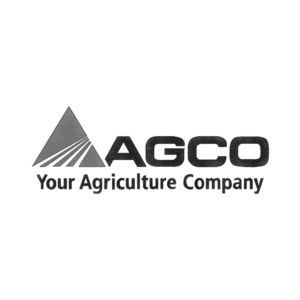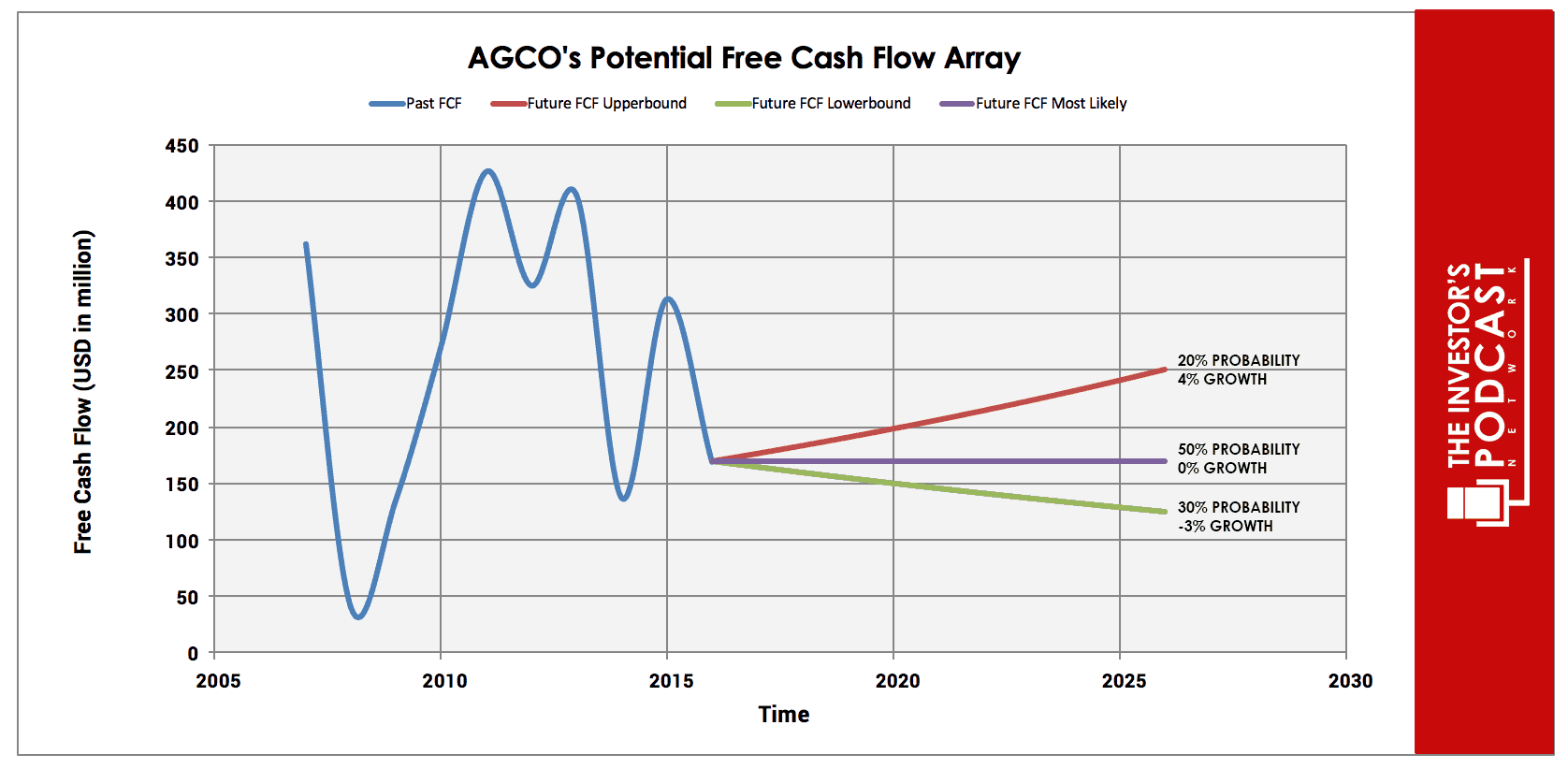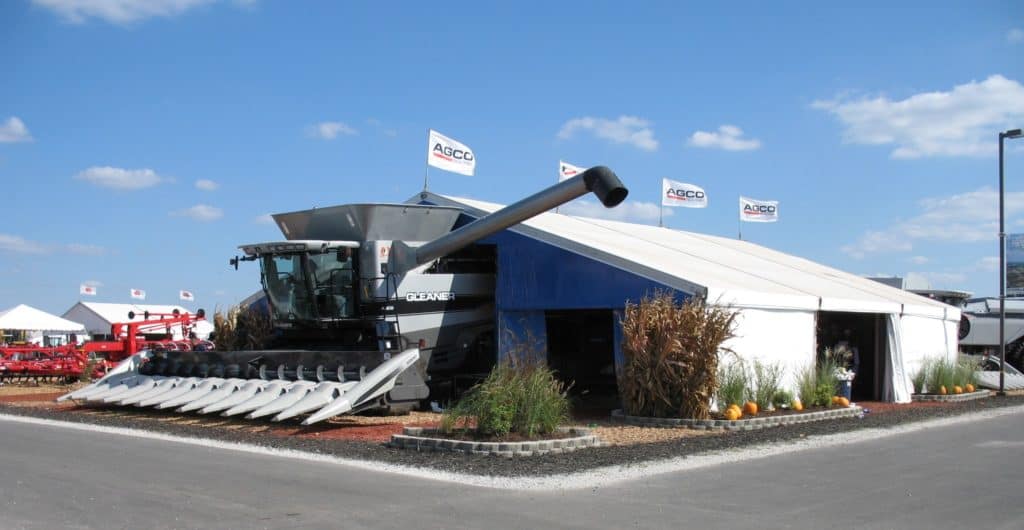Intrinsic Value Assessment Of AGCO Corporation (AGCO)
By Christoph Wolf From The Investor’s Podcast Network | 06 March 2018
INTRODUCTION
AGCO Corporation designs, builds, and sells agricultural machinery, such as tractors, replacement systems, combine harvesters, grain storage systems, hay & forage equipment, and many more. With 57% of its revenue, tractors comprise by far the largest part of its business. Its brands Fendt, Challenger, GSI, Valtra, and others are well known and stand for quality and reliability.

The company has revenues of around $7.9 billion, making it considerably smaller than its main competitors Kubota, CNHI, and especially Deere & Co. Since AGCO is more focused on the markets in EMEA, Asia, and Latin America, the company partly manages to avoid a full-scale competition with the 800-pound gorilla Deere & Co. – which is heavily focused on the large North American market. Considering that AGCO’s stock price of $66 is near its all-time high, should investors still pile in or is the current price already too high?
THE INTRINSIC VALUE OF AGCO CORPORATION
To determine the value of AGCO, let’s start by looking at the company’s history of free cash flow. The free cash flow is important because it represents the company’s ability to retain earnings and grow the business. Most importantly, it demonstrates a return on the invested sum that might be invested into the ownership of equity of the business. Below is a chart of AGCO’s free cash flow over the past ten years.

As one can see, the cash flows have been quite volatile during the last ten years, which illustrates the highly cyclical agriculture business. Due to this high uncertainty, we will use a conservative estimate for AGCO’s future cash flows.

Each line in the above graph represents a certain probability for occurring. We assume a 20% chance for the upper growth rate of 4% per year, a 50% chance for zero growth, and a 30% chance for the worst-case scenario of an annual decline of 3%. This rather narrow band reflects the fact that AGCO, despite being in a cyclical market, also operates in a comparatively recession-proof business segment. Agricultural prices might be very volatile, but supply and demand always fall back into line after a while. And no matter what happens in the future, food will for sure remain in high demand.
Assuming these growth rates and probabilities are accurate, AGCO can be expected to give only a 0.4 % annual return at the current price of $66. Now, let’s discuss how and why those free cash flows could be achieved.
THE COMPETITIVE ADVANTAGE OF AGCO CORPORATION
AGCO possesses some unique advantages that should allow it to be very successful in the future:
- Niche in EMEA, Asia and Latin America. Rather than directly competing with the much larger Deere & Co. in North America, AGCO’s business is more focused on EMEA (Europe, Middle East, and Africa), Asia and Latin America than on North America. This is also illustrated by the different product portfolios. Deere & Co. is specialized in large, powerful, and expensive machines, which are ideally suited for the vast farms in North America. In contrast, AGCO’s smaller and cheaper products are more in demand in its key markets, where farms tend to be smaller.
- Intact Business Model. Unless the world ends tomorrow, food and other agricultural products will be needed. Therefore, high-tech agricultural machinery will be in ever higher demand.
- High-end Inbound Supply Chain. AGCO’s Smart Logistics initiative rests on a cloud-based Supply Chain Management IT solution. It integrates more than 1500 material suppliers and more than 70 logistics service providers. This enables AGCO to reduce the cost of its inbound supply chain and improve its time delivery performance.
RISK FACTORS
Several risks might limit the growth prospects of AGCO Corporation:
- Compared to Deere & Co. and CNHI, AGCO is a rather small player. While not its main market, AGCO also does business in North America, where it has a disadvantage due to its limited size. Also, developing new important innovations can be very costly – and this is easier to achieve for a big company due to economies of scale.
- Cyclical industry. Future prices of agricultural products are very hard to predict and prone to heavy swings. This uncertainty often makes farmers reluctant to invest in expensive machinery, which hurts AGCO’s business.
- Currency Risks. AGCO’s business is spread all over the world. As a result, its earnings are highly dependent on currency exchange rates, which further adds risk when predicting its future success.

OPPORTUNITY COSTS
When looking at various investing opportunities on the market today, let’s compare the expected return of AGCO to other ideas. First, one could invest in the ten-year treasury bond which is producing a 2.8% return. Considering the bond is completely impacted by inflation, the real return of this option is likely only around 1%. Currently, the S&P 500 Shiller P/E ratio is 32.4. As a result, the U.S. Stock Market is priced at a 3.1% yield. If one were to invest in the S&P500, they might purchase a low-cost ETF to take advantage of this return.
MACRO FACTORS
Both the agriculture business itself (i.e., running a farm) and the agriculture equipment business are characterized by two competing traits. On the one hand, these businesses are very volatile and dependent on many variables that are hard to predict. Prices for crops and other agricultural products are highly sensitive to demand and supply – which in return depend on unknowns such as weather or politics. The resulting heavy price swings of their products can only be partially dampened by farmers using futures and insurance. This volatility in agricultural products is then passed on to equipment suppliers such as AGCO.
In contrast to this risk, farm products will probably remain in need forever. Food and other agricultural products will be in high demand for as long as humans populate the earth. An ever-growing world population, climate change, and the naturally limited area of available farmland will only boost this demand. As a result, AGCO’s business model is under no threat anytime soon.
SUMMARY
AGCO Corporation is a solid company which operates in a sector of the economy that is bound to remain relevant. It has many important advantages going for it – but also has very strong competitors and operates in the highly cyclical agricultural business. That said, it is expected that AGCO will remain successful in the future.
Considering these pros and cons, the current share price of $66 seems not to adequately compensate for the risk taken. Investors might be better advised to wait for a more attractive entry price.
To learn more about intrinsic value, check out our comprehensive guide to calculating the intrinsic value of stocks.





